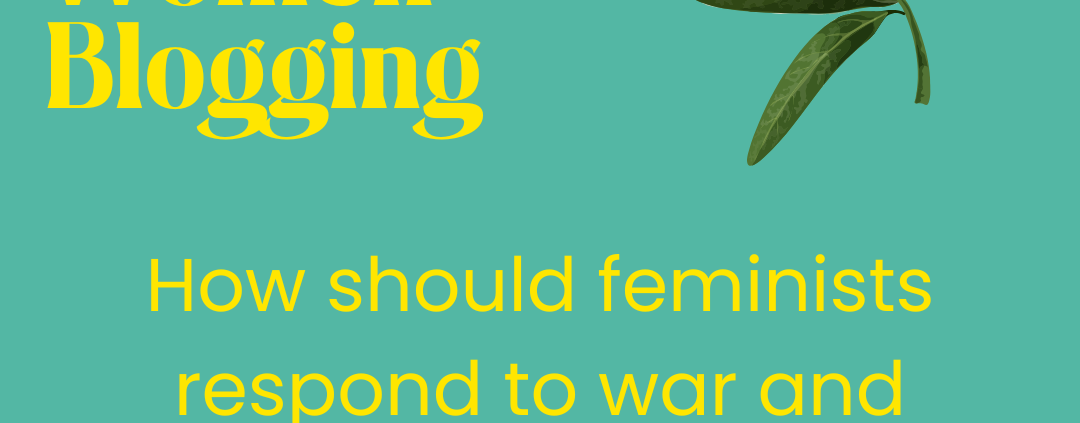This article is the second in a series of opinion pieces from the Feminist Public examining what the feminist response to war and conflict should be. You can find out more about the series and how you can take part here.
There are more than 120 active, armed conflicts ravaging different parts of the world as I’m writing this, according to official UN figures. Armed conflicts directly affect more than 600 million women, and the number of women killed in conflict is rising rapidly. In Gaza and Palestine, the majority of the more than 40,000 dead are women and children; many more have been injured and traumatised. In Sudan, combatants often target refugee convoys, and systematically attack women; in Haiti, sexual violence is used as a weapon of war to instil fear and control communities. In other conflicts, including Ukraine, Syria and the Democratic Republic of Congo, many women are forced to leave their homes and become displaced, either within their country of origin or abroad. Others, including older and disabled women in particular, may be left behind and become isolated from all social support and services. For example in Yemen, women have limited agency and their movements within their communities are restricted, and Afghanistan stands out as women and girls are slowly being erased from society altogether, with major mental health impacts for women and girls and an alarming trend of increasing suicide and suicide attempts.
The common thread across conflicts, though, is that women are disproportionately and specifically affected by conflict related violence and violence against women and girls, while often at the same time carrying responsibility for maintaining communities and social support structures. In Ukraine, for example, many women lead local communities, and have taken responsibility for organising logistics and supply chains to the frontline. In Gaza, women are volunteering in roles from educators to healthcare staff, and the same is reported in displacement camps across the world. Many more women become carers for orphaned children and people who need additional support. Most, however, are excluded from any peace negotiations, and women’s needs are rarely front and centre of peace agreements.
Beyond these immediate crises, there are also many more societies at different stages of post conflict recovery. Women in Northern Ireland are intimately familiar with the legacy and trauma of conflict, and also with how complex the post conflict process is. Women’s Platform is one of the partners in the Women’s Spaces project with Northern Ireland Rural Women’s Network, Women’s Regional Development Agency and Women’s Support Network, which aims to build women’s capacity to engage in peacebuilding and public life, and has engaged with over 400 women in its initial two years. This work is highlighting that Women’s Spaces has been the first opportunity for many women to share their stories, views and priorities, and there is strong interest among women to build on this to engage more in decision making at all levels, which is a current priority for Women’s Spaces. However, this also reflects wider evidence from women across Northern Ireland: women are sidelined and ignored in decision making, and have very little say in many communities, although women continue to carry responsibility for social networks and support.
This experience is shared by women in post conflict societies across the world. There is clear evidence that peace agreements tend to last longer when women are involved in negotiating them, and implementation is stronger when women are part of leading communities at all levels. However, only 12% of peace agreements signed in 1990-2000 and only a third signed in 2011-20 have referenced women; the Belfast/Good Friday Agreement is among this tiny minority, and has been highlighted worldwide for the role the Women’s Coalition played in the peace process. Women in post conflict societies from Liberia to Lebanon and South Africa also share the view that women’s role as leaders tends to be forgotten post conflict, and in some cases there are active attempts to sideline women in favour of men who were part of the conflict. Rwanda stands out as a rare example where women have held half of parliamentary seats following the peace agreement and a truth recovery process; in Colombia, there is also an active process to strengthen gender equality, including LGBTQIA+ inclusion, as a result of a peace process where women’s organisations had an influential, although informal role.
Internationally, UN Security Council Resolution 1325 on women, peace and security has recognised the gendered impacts of conflict since 2000, and highlighted the crucial role of women’s equal power and participation in peace negotiations and decision making at all levels. The Resolution remains the driving force behind the global women, peace and security agenda, which focuses on strengthening women’s voices in decision making at all levels, and addressing the specific gendered impacts of conflict, from violence against women and girls to healthcare needs both during and after conflict. It also introduced a requirement on UN member states to develop National Action Plans on women, peace and security, which create a mechanism to focus on gender equality in decision making. UNSCR 1325 has also been strengthened by subsequent Resolutions focused on specific elements of the WPS agenda, including sexual violence in conflict, which create a strong framework for action. This framework includes UNSCR 1820 (2008), UNSCR 1888 (2009), UNSCR 1889 (2009), UNSCR 1960 (2010), UNSCR 2106 (2013), UNSCR 2122 (2013), UNSCR 2242 (2015) and UNSCR 2467 (2019),
In total just over 100 countries have so far developed at least one National Action Plan; the UK is currently on its fifth plan (2023-27), while Ireland is in the final year of its third NAP (2019-2024). There are, however, differences between plans: Ireland, alongside Canada, Germany, Norway and Sweden integrates domestic and overseas elements, and Ireland has used its NAP to drive foreign policy priorities, including during its membership of the UN Security Council 2021-22. Northern Ireland is included in the Irish NAP, with a focus on supporting Northern Ireland level work on peacebuilding. The Irish government is also funding women and peacebuilding through the Reconciliation Fund; the Women’s Spaces project is one of the Reconciliation Fund Strategic Partnerships. Meanwhile, the current UK NAP is the first to include reference to Northern Ireland and a link between domestic and foreign policy; previous UK NAPs have been focused solely overseas. The change is significant in that it enables new conversations, such as a focus on the needs of women arriving in the UK from conflict regions, who to date have received limited attention. Women’s Platform is also working with the Northern Ireland Office and Foreign, Commonwealth and Development Office to link work within Women’s Spaces with women peacebuilders in other NAP priority countries, and explore mechanisms for sharing learning and good practice.
Globally, the women, peace and security agenda offers a way to build solidarity, as well as concrete mechanisms to increase women’s power and participation in decision making. All UN mechanisms depend on strong advocacy, which is vital in the current global context of increasing threats to human rights, and global networks are therefore more important than ever. Therefore, strong implementation of both the UK and Irish NAP are important, and within this, the voices of women in Northern Ireland as women have a lot to share locally as well as internationally.
By Jonna Monaghan, Women’s Platform


